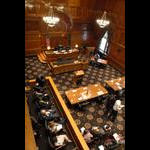Unfinished Thoughts and Corresponding Links
Despite my best efforts, I didn’t manage to write posts about all the topics that caught my fancy during my turn as Student Blogger of the Month. So I’m treating (subjecting?) you to some quick hits on topics that I wanted to blog about but didn’t get to. What this boils down to is linking to some of the contents of my “blog” folder in my Internet bookmarks. I’m sharing these because I think I found some interesting topics that I didn’t get a chance to write about in a complete post.
Government thoughts
1) I tried several times to put together a post inspired by a Chuck Klosterman article in Esquire entitled “You Say You Want a Revolution.” I never quite managed to make it work. In his article Klosterman wondered “what would have to happen before the American populace would try to overthrow its own government?” A little less dramatically, I wonder what would have to happen for the citizens of the country to amend our Constitution? We’ve had several events in the recent past (Bush v. Gore and the elections that led to it, the Clinton impeachment and perjury situation, Hurricane Katrina, 9-11) that might have been an impetus to fundamentally change the way our federal government works by amending the Constitution. But, we, as a country, have not chosen to take that step. What type of event would have to happen to lead to a Constitutional Amendment that could actually be ratified?


